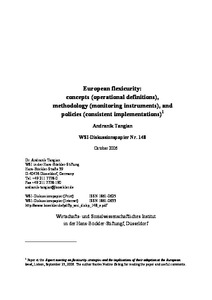European flexicurity: concepts (operational definitions), methodology (monitoring instruments), and policies (consistent implementations)
"The notion of flexicurity promotes the idea of compensation of labour market deregulation (= flexibilization) with advantages in employment and social security. The paper contains a brief history of the concept and its operational definition. To monitor effects of flexicurity policies in Europ...
| Main Author: | |
|---|---|
| Institution: | ETUI-European Trade Union Institute |
| Format: | TEXT |
| Language: | English |
| Published: |
Düsseldorf
2006
HBS |
| Subjects: | |
| Online Access: | https://www.labourline.org/KENTIKA-19293186124910113689-european-flexicurity-concepts-.htm |
| Summary: | "The notion of flexicurity promotes the idea of compensation of labour market deregulation (= flexibilization) with advantages in employment and social security. The paper contains a brief history of the concept and its operational definition. To monitor effects of flexicurity policies in Europe, flexicurity indicators are constructed. The European flexicurity polices are analyzed in the neo-liberal perspective, from the trade-unionist viewpoint, and within the conception of European welfare state. The empirical investigation shows that, contrary to political promises and theoretical considerations, the deregulation of European labour markets is absolutely predominating. A contradiction between several European employment policies is suggested to surmount by introducing a so called flexinsurance, meaning that the employer's contribution to social security should be proportional to the flexibility of the contract/risk of becoming unemployed in conjunction with elements of the basic minimum income model. " |
|---|---|
| Physical Description: | 60 p. Digital |

